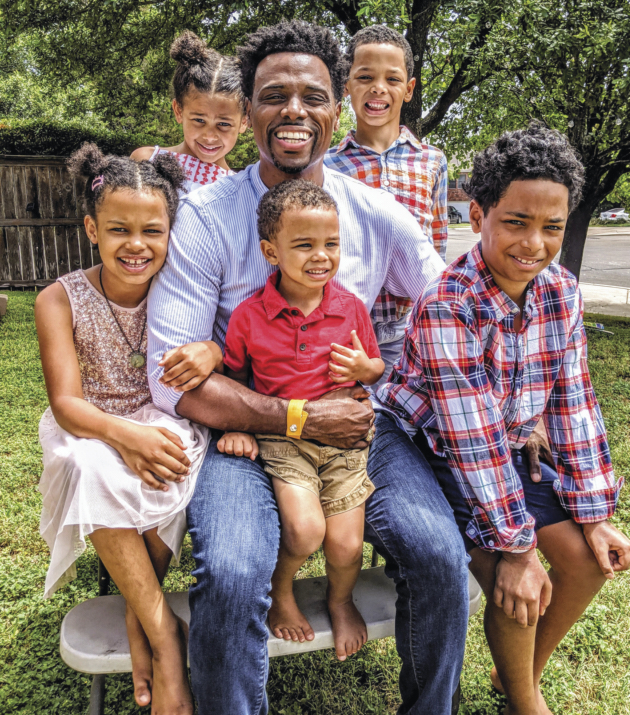Longhorn Daron K. Roberts’ New Children’s Book Offers a Lesson in Empathy For All Ages

When I speak with Daron K. Roberts, BA ’01, Life Member, over the phone one early morning in June, the former NFL coach, UT lecturer, and founding director of the Center for Sports Leadership & Innovation has been navigating virtual teaching and working with his wife to take care of their five young kids.
“It’s been a busier spring than normal,” says Roberts, a past recipient of the Texas Excellence Scholarship and an Outstanding Young Texas Ex. He’s gearing up for the debut of his new book, A Kid’s Book About Empathy, which he wrote using lectures he gives his students and his own life experiences as a Black man in the U.S. It is just one installment published by the direct-to-consumer publishing brand A Kids Book About featuring authors from all backgrounds that cover challenging topics like racism, feminism, and mental health disorders. The book, composed of colorful pages and bold text, defines empathy as “when you stand in someone else’s shoes. It’s when you feel with someone who is experiencing something that’s hard, sad, or scary.”
The Alcalde spoke with Roberts about the power of empathy and its importance today.
What is the difference between empathy and sympathy?
Empathy is when you feel with someone and sympathy is when you feel for someone. The key distinction is that sympathy has distance. Empathy is about staying out of judgment and offering neutral active listening which is tough. Immediately when things are difficult we want to prescribe solutions. But we have to step out of the problem and really engage the active listening part of our brains.
How do you put empathy into practice?
First, breathe. It helps heart rates slow down; stress levels are reduced. Try to really focus on three steps: assess, adapt, advance. Take the emotional temperature of your body. Oftentimes we feel like we have to put on this façade. After you assess, be honest about what you need to adapt. There are things you have to change in yourself. Work on having the courage to adapt. It is important then to advance. Take one small step forward. Whether it’s a micro-win in work, one in family life, or one related to health.
How do you teach empathy in your classes?
I have a series of exercises. One example is I give the students blindfolds and assign them partners. Starting at the Barbara Jordan statue or the MLK statue, one of them will be blindfolded and the other has to lead them from one place to the other. Once they get there, they reverse roles. It’s a vulnerability exercise. I pair unlikely students. Race and gender become less important when you’re depending on someone else. The idea is to strip us of the emotional debris that comes when we look and see that race, gender, and socioeconomic differences can be more in tune with just the connection of another human.
Why is that connection important?
Let’s look at what happened with George Floyd. When he yelled out for his mother, the national sentiment switched from sympathy to empathy. You can identify with being in such a state of danger, you call out for your mother. When I look at the national picture there are so many people talking over each other. Racism is the issue this country never quite dealt with in our 400-year battle over race.
Why do we struggle to empathize with others?
People have biases and they need to understand that they may have belief systems that don’t coincide with the American reality. You have to be willing to wiretap your brain. Psychology shows that we’re constantly trying to make sense of an experience in relation to our own lives. We hear Black Lives Matter or we see an episode of police brutality and our brains want to go back to our own history that connects to our own experience. The evils of white privilege are that that connection won’t match up with what they’re seeing and hearing. Empathy is the foundation of connection. Empathy is the gateway for people to understand and learn and, for those who are committed to making change, to take action to correct the wrongs in our society.
This interview has been edited and condensed.





